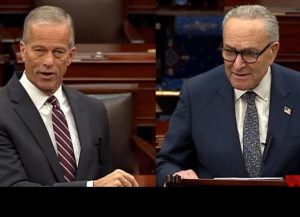Lawmakers Debate Constitutional Tools Amid Mayoral Race Tensions
With polls closing in New York City’s closely contested mayoral election, several House Republicans are quietly weighing an unprecedented constitutional challenge that could block front-runner Zohran Mamdani from assuming office if he wins.
The discussions, confirmed by multiple congressional aides, focus on whether the Constitution’s post–Civil War “insurrection clause” — Section 3 of the 14th Amendment — could be invoked to disqualify the Democratic socialist lawmaker from holding public office.
The debate, though still in its early stages, underscores how the contentious race for New York City mayor has evolved into a broader national flashpoint over political ideology, immigration, and constitutional authority.
Section 3 of the 14th Amendment Resurfaces
The 14th Amendment’s third section bars any individual who has “engaged in insurrection or rebellion” or provided “aid or comfort” to America’s enemies from holding office. Originally written to prevent former Confederates from returning to power after the Civil War, the clause has recently resurfaced in political debates surrounding ballot eligibility.
“This is not theoretical — it’s real,” said Stefano Forte, president of the New York Young Republican Club, one of the organizations advocating for action. “There is a legitimate push to see Zohran Mamdani either removed from the ballot or removed from office if he wins on Tuesday.”
Forte and others argue that Mamdani’s past remarks calling to “resist ICE” and his affiliations with progressive organizations could meet the constitutional threshold of providing “aid or comfort” to entities hostile to U.S. interests.
Congress at the Center of a Renewed Constitutional Debate
House Republicans, holding a narrow 219–213 majority, are reportedly studying whether Section 3 could be enforced through legislation or congressional resolution. The conversation gained traction following the Supreme Court’s 2024 decision striking down Colorado’s attempt to remove Donald Trump from its ballot under the same clause.
In that ruling, the Court determined that only Congress has the authority to enforce Section 3 of the 14th Amendment — a finding that now serves as the basis for renewed GOP exploration.
“Congress, not individual states, has the constitutional responsibility here,” said one Republican aide familiar with the discussions. “The Colorado decision changed the landscape.”
While any attempt to invoke the 14th Amendment against Mamdani would face steep legal and procedural hurdles — including likely court challenges and opposition from the Democrat-controlled Senate — Republican leaders are said to be considering symbolic action to signal intent.
Citizenship Under Scrutiny
In parallel with the constitutional review, some lawmakers are pressuring the Justice Department to examine Mamdani’s naturalization process. Representative Andy Ogles of Tennessee sent a letter Monday to Attorney General Pamela Bondi requesting an inquiry into what he described as “statements inconsistent with the oath of allegiance required of new citizens.”
Ogles alleged that Mamdani, who became a U.S. citizen in 2018, violated his naturalization oath by refusing to disavow “violent anti-American rhetoric.” He referenced public comments Mamdani made in 2019 urging resistance to federal immigration enforcement, suggesting they could be interpreted as undermining U.S. law.
In his letter, Ogles argued that Mamdani’s “broader pattern of conduct” — including his membership in the Democratic Socialists of America — should prompt a Justice Department review.
“The question is whether someone who advocates for defiance of federal law and praises individuals convicted of funding terrorism can simultaneously uphold the oath of allegiance,” Ogles wrote.
Calls for a Federal Investigation
Representative Randy Fine of Florida joined Ogles in urging scrutiny of Mamdani’s background, alleging the candidate failed to disclose material affiliations during his citizenship process. Fine specifically pointed to Mamdani’s past comments defending the “Holy Land Five,” a group of Palestinian-American leaders convicted in 2008 of illegally funneling money to Hamas.
“New York City is about to elect someone who sympathized with convicted extremists,” Fine said on X. “If the city falls to communism next week, they’ll have no one to blame but themselves.”
The Justice Department confirmed receipt of Ogles’ letter but declined to provide further details. “The Department does not comment on the status of ongoing or potential investigations,” a spokesperson said, noting that responses to congressional correspondence have been delayed by the ongoing government shutdown.
Mamdani Pushes Back
Mamdani, who currently represents Astoria, Queens, in the New York State Assembly, dismissed the allegations as politically motivated. “No matter how many times these Republican Congress members or the president of this country calls me a Communist, it doesn’t make it true,” he told reporters over the weekend.
He accused Republican lawmakers of weaponizing constitutional language to silence opposition. “The 14th Amendment was written to protect democracy after the Civil War — not to be used as a tool against elected officials who happen to disagree with them,” Mamdani said.
Campaign advisers suggested that the GOP’s interest in invoking the clause was intended to energize conservative voters ahead of the 2026 midterms.
Legal Experts Caution Against Overreach
Constitutional scholars note that applying Section 3 of the 14th Amendment to a local officeholder would face significant obstacles. “There’s no precedent for Congress attempting to disqualify a municipal official,” said Georgetown University law professor Rachel Morgan. “Section 3 was designed for insurrectionists — people who actively took up arms against the United States.”
Morgan added that courts would almost certainly demand clear evidence of an “insurrectionary act” or collaboration with an enemy of the state — a high legal bar.
“The political rhetoric around ‘aid or comfort’ doesn’t meet the constitutional test,” she said. “Unless there’s evidence of violent rebellion or direct support for an enemy organization, it’s not going to hold up.”
The Broader Political Implications
Even if the 14th Amendment challenge goes nowhere, its introduction underscores the deepening partisan divide over ideology and national loyalty. For some Republicans, the effort signals a willingness to use constitutional mechanisms to check figures they view as extreme. For Democrats, it’s a sign of escalating political warfare.
“This is about drawing lines — not just on the ballot, but in the Constitution itself,” said political analyst Jerome Ellis. “The idea that Congress could weigh in on a city election shows how blurred the lines between federal and local politics have become.”
What Comes Next
Should Mamdani win the election, House Republicans could move to introduce a resolution declaring him ineligible for office. Even as a symbolic measure, such a vote would likely inflame debate over the scope of congressional authority and the limits of partisan enforcement.
For now, the Justice Department’s position remains one of neutrality. “We apply the law as written,” a DOJ official said Tuesday evening. “No one is above the Constitution, but no one is below its protection either.”
With tensions already high in New York City and across Washington, the coming days may determine whether the 14th Amendment — a Reconstruction-era safeguard — becomes the latest flashpoint in America’s modern political battles.

Sarah Mitchell is a bestselling novelist recognized for her insightful and emotionally resonant stories that explore the complexities of human relationships. Originally from Denver, Colorado, Sarah grew up in a family of teachers who nurtured her curiosity and love for storytelling. She studied psychology at Stanford University, where she became fascinated by the intricacies of human behavior—an interest that would later shape her writing career. Sarah’s novels are praised for their nuanced characters, intricate plots, and ability to capture the subtle tensions that define love, friendship, and family ties. Her breakthrough novel, The Spaces Between Us, became an instant bestseller, lauded for its honest portrayal of strained family relationships and the fragile bonds that hold people together. Since then, she has published several works that continue to captivate audiences around the world. Outside of her writing career, Sarah is passionate about mental health advocacy and often partners with organizations to promote awareness and support for those struggling with emotional well-being. Her personal life is quieter—she enjoys hiking in the Colorado mountains, practicing yoga, and spending time with close friends. With each new book, Sarah Mitchell cements her reputation as a writer who illuminates the beauty and struggles of human connection.









